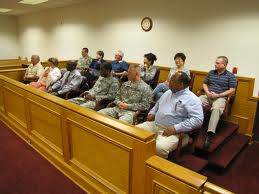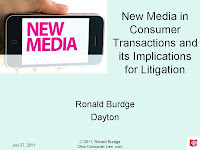I just got back from several days out of town last week and something extraordinary happened during the 6+ hours I was in the air. This is way off topic so grab a cup of coffee and let me tell you about it.
In November 2007
Janet Varnell and I discussed how to apply
Michael Gerber’s E-Myth principles to Consumer Law lawyering in a presentation titled “Lawyering E(entrepreneur) Myths” at the annual
NCLC Consumer Rights Litigation Conference in Washington DC. Little did we know that within four years Gerber would publish “The E-Myth Attorney: Why Most Legal Practices Don’t Work and What to Do About It,” a companion volume to his original “The E-Myth” book.

We won’t take credit for it, certainly, but it turns out that Janet and I were right in our thoughts on how the E-Myth principles could be applied to Consumer Lawyers and many of the lawyer E-Myth ideas we talked about back then have made it into print.
While they do teach us how to be lawyers, they don’t teach “How to Run Your Business” in law school. Gerber’s new book should be mandatory reading for third year law students. It is that good. And if you are a struggling lawyer looking for a way to free up your life and get on solid financial footing, this book is for you. It is the book that Janet and I should have called Gerber up and offered to help him write.
But we didn’t. That credit goes to
Robert Armstrong and Sanford Fisch, two attorneys who were inspired by the first E-Myth book. Now you get a chance to look over their shoulder and find out how to apply the E-Myth principles to successfully running your own practice. It doesn’t matter if you’re a young pup fresh out of law school or an old dog like me — there’s plenty here to apply to every stage of your law career — and it’s never too late to teach an old dog a few new tricks.
This book is full of so many great tips and advice that it should be on every Consumer Lawyer’s night stand. Don’t sit it on your desk and promise yourself that you’ll read it right after you clear that stack of papers next to it. Don’t kid yourself. Get away from the office and grab some quiet time when you can take this thin 178-page volume to heart and mind.
It’s a quick and easy read but the principles in it will both inspire and aggravate you. Inspire you because you’ll likely find yourself saying “Yeah, that is absolutely right” and aggravate you because you add “why didn’t I think of that years ago?” Either way, I promise you will get more out of this book than you likely learned about lawyering in your entire first year of practice. In fact, you’ll probably recognize for the first time some of the many mistakes you made at the start of your legal career and also see, maybe for the first time, how you could have (and will from now on) avoid them.
Some of the chapter titles include “On the Subject of Money,” “Managing the Unmanageable,” “Your Client Loves You, He Loves You Not,” “What time Do You Have?” and “The Reason Behind the Work.” Each of those, and all the other
26 chapters are invaluable.
There are chapters that explain why lawyers aren’t business people and how to fix it, the importance of knowing your numbers, the good and the bad and the ugly of handling people-clients-associates-and-others, the four kinds of money, how to handle a prospective client who asks for a fee estimate at the beginning of a case, why a business plan matters, the importance of time to a lawyer (hint: it’s a lot more than just Abraham Lincoln’s quote), why systems matter in a law practice, what to do when change comes to your practice and to your life, and, of course, the purpose behind your law practice.
The authors talk about so much that this review can’t possibly do the book justice. So instead I’ll just tell you to get the book and then pay particular attention to the wisdom found on these specific pages: 16-22, 26, 29-30, 32-43, 44, 55, 67, 73, 93, 99-100 — oh heck you should pay attention to the wisdom found all thru the book.
At the beginning of this review I said that they should make this required reading for every third year student. Actually that’s wrong.
It should be the first thing a new law student reads at the start of law school - so they get exposed to the importance of the business side of practicing law right away.
And it should also be the last thing a graduating law student reads - so that they can then see and better understand the business principles it teaches in the light of the legal training they have completed.
As Professor Kings field said in the 1973 movie,
The Paper Chase, to his new law students, “
You come in here with a skull full of mush and, if you survive, you’ll leave thinking like a lawyer.” If you read this book, you can start thinking like a business person too. And if you don’t think like a business person too, well, then thinking like a lawyer won’t be enough to save you from yourself.
As I read this book on the airplane last week, I recalled Janet and I saying many of these things to the 50-plus attendees of that Doing Well While Doing Good seminar back in 2007. It felt good to know that Janet and I were right in some of our thinking about the E-Myth principles and their application to Consumer Lawyers. At the same time, there was so very much more to it.
Get this book. Read it. See for yourself.
And if you know someone graduating from law school, give them your copy after you read it. They are going to need it.
 We're in Colorado Springs today to give a seminar on Success, E-Myth Lawyering Principles, and Business Economics for the National Association of Consumer Bankruptcy Attorneys at their annual Fall Workshop. There have been tons of great tips and advice on the business of lawyering during this two day workshop, from some of the best business minds in law, and we're honored to have been invited to speak.
We're in Colorado Springs today to give a seminar on Success, E-Myth Lawyering Principles, and Business Economics for the National Association of Consumer Bankruptcy Attorneys at their annual Fall Workshop. There have been tons of great tips and advice on the business of lawyering during this two day workshop, from some of the best business minds in law, and we're honored to have been invited to speak.













